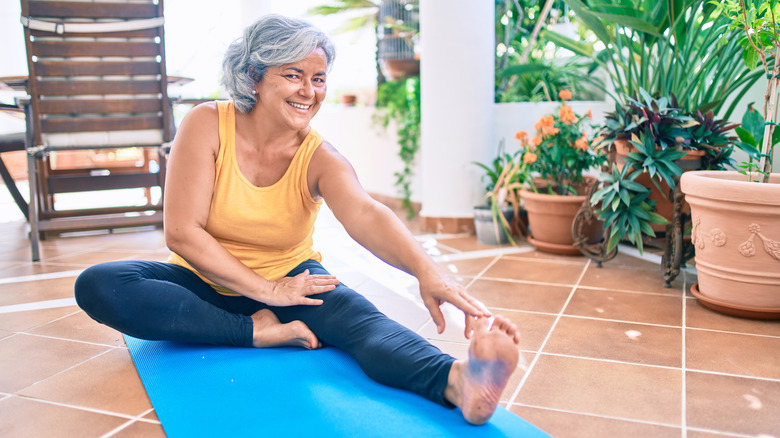Can You Actually "Think" Yourself Younger?
Aging can be measured by more than just the number of birthdays we've had. While our number of years lived is referred to as our chronological age, biological age is determined by our physiological health (via Verywell Health).
Founder and president of the Complementary Medical Association Jayney Goddard writes via The Daily Mail that she calculates her biological age using a variety of factors such as sleep, libido, skin elasticity, balance, vision, and reaction time, amongst others. After a dangerous rheumatoid arthritis flare-up that landed her in hospice, Goddard shared how after making a variety of lifestyle changes, at age 55, her biological health now resembles that of a 27-year-old.
Goddard's story is not an isolated incident. Longevity expert Sergey Young tells Mindbodygreen, "If you think you're younger, your body actually works differently."
Science has shown that feeling younger may potentially increase longevity. As reported by The Guardian, a 2002 long-term study known as the Ohio Longitudinal Study of Aging and Retirement found through survey research of older adults that those who thought positively about aging lived roughly 7.5 years longer than those who had negative mental associations with growing older, such as a belief that they were now less useful.
Thinking yourself younger could prompt physical changes
Even more astonishingly, science has shown that acting younger may help convince your body of your youth, resulting in positive health outcomes. Featured in The New York Times, one early study illustrating the connection between mindset and reversed aging was conducted in 1981 in which eight elderly men were immersed in a time-warp experiment by spending a week living in an environment designed to resemble life in 1959. Not only were the subjects surrounded by younger photos of themselves, and magazines and books from the era, but they were also instructed by Harvard psychology professor Ellen Langer to "make a psychological attempt to be the person they were 22 years ago." Detailing study findings in her book "Counter Clockwise," Langer reveals that after five days, the men experienced improvements in eyesight, appearance, and flexibility, and performed significantly better on intelligence tests.
But before you consider moving back home into your childhood bedroom, researcher Dr. Markus Wettstein tells Eat This, Not That! that the key to slowing the effects of aging isn't about mentally retreating into the mind of your young self, but rather, it's about embracing a positive mindset around aging and knowing that we can still experience fulfillment as we approach the second half of life.


